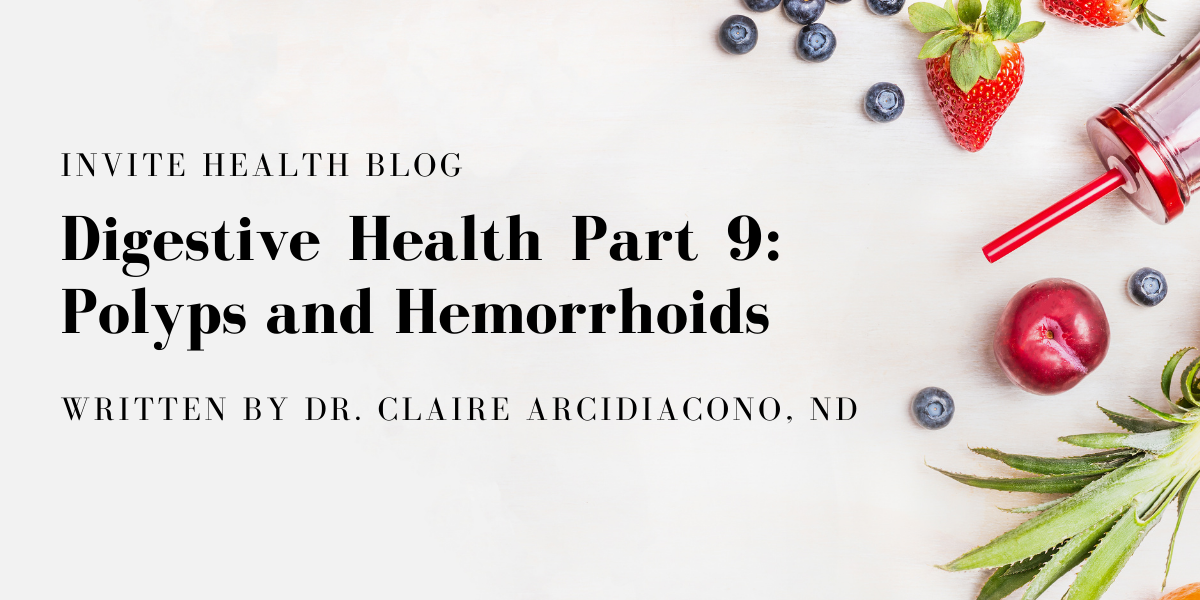Digestion Health Part 9: Polyps and Hemorrhoids


Written by Dr. Claire Arcidiacono, ND hemorrhoids
For further questions or concerns email me at [email protected]†
Polyps
Let’s talk about colon and anal polyps. A colon polyp is a group of cells that form a small clump on the lining. While polyps on their own are usually not considered dangerous, they are a huge risk factor for colon cancer. One of the best ways to reduce the risk is through screening and removing any colon polyps. (1)
Very often colon polyps are asymptomatic but a sign of polyps can include rectal bleeding. It’s interesting to note that if the polyps are in the lower part of the colon, the blood is more likely to be a bright red either in the stool itself or when you wipe. However, if the polyp is in the upper part of the colon, the blood will be dark change color to black. This blood loss over time can lead to anemia, an iron deficiency that would be present on a routine blood test. Other symptoms can include changes in bowel movements and abdominal pain.
Risk factors for colon polyps are having family history of colon cancer, being an individual over 50, inflammatory conditions such as Irritable Bowel Disease and Irritable Bowel Syndrome, and an unhealthy lifestyle that includes habits such as smoking, excessive alcohol drinking, obesity, lack of movement and excessive fat intake/ low fiber intake. (2)
There are several genetic disorders that can be a cause for polyps. Lynch syndrome only has a few malignant polyps or Familiar adenomatous polyp or FAP is when the polyps start to develop in the teen years and hundreds or even thousands can develop. A variant of FAP called Gardner syndrome, consists of polyps that develop throughout the intestines and into the small intestine. MUTYH associated polyposis is similar to FAP but is caused by a mutation in the MYH gene. Peutz-Jeghers syndrome also causes polyps. Lastly serrated polyposis syndrome leads to multiple serrated adenomatous polyps in the upper right side of the colon. (3)
A polyp is just a clump of cells that can be non-neoplastic or neoplastic. Non-neoplastic polyps are less likely to become cancerous whereas neoplastic are likely to become cancerous. Non-neoplastic polyps can include inflammatory polyps, hamartomatous and hyper-plastic polyps. Neoplastic polyps include adenomas polyps and serrated polyps. Polyps grow in different shapes. Pedunculated polyps grow in the shape of a mushroom with a stem and a head. Sessile polyps grow elevated and flat like a plateau rather than a mountain. A flat polyp is just as the name says– flat. (4)
The best way to determine if you have any colon polyps is to get a colonoscopy or a flexible sigmoidoscopy. If polyps are found during a routine colonoscopy, it may increase how often you need to have a colonoscopy. (5)
Hemorrhoids
To most people, hemorrhoids might seem to be very similar to polyps. Both may appear to be “growths.” However they’re not the same. Hemorrhoids are actually swollen veins in the lower part of the rectum and anus. Polyps are a growth of cells in a clump. While both hemorrhoids and colon polyps can cause rectal bleeding, hemorrhoids are the Number 1 cause. Hemorrhoids can be either internal or external. Symptoms of hemorrhoids are very similar to polyps including blood in the stool or when you wipe, swelling, pain and itching. It’s important to note that even though hemorrhoids are usually not dangerous, if bleeding continues for more than a week it is important to see a doctor.
The risk factors are similar to polyps, having an unhealthy lifestyle. While constipation and pushing during a bowel movement are the most common causes of hemorrhoids. Some other risk factors can include anal sex, and pregnancy. Changing your unhealthy life style habits including: Losing weight if obese, stop smoking, reduce alcohol intake and increase water/fiber as well as decrease fat/ meat consumption. I would also encourage an increase in activity. (11) Eliminate constipation! Please see my blog for helpful hints on encouraging healthy bowel movements! Probiotics have been found in studies to be very helpful for polyps (12) and hemorrhoids. (13) Reducing inflammation is always helpful especially in the case of polyps! Studies show that Turmeric is helpful in preventing polyps! (14) Please see Invites Biocurcumin 5 loxin, Turmeric with ginger and Curcumin blend. Studies also have found that vitamin D and quercetin help prevent polyps. See Invites extensive line of vitamin D and our Quercetin! (15) Sitz baths a type of hydrotherapy have been found to help with hemorrhoids. (16) Herbal formulas that have been found to be helpful for hemorrhoids include Gotu Kola, Horse chestnut and bilberry. (17) Please see Invites Veins Hx and Bilberry!
Just like with polyps, a colonoscopy and sigmoidoscopy are done to rule out hemorrhoids. They may also do an endoscopy to help diagnose hemorrhoids. (6) The best way to treat a polyp or hemorrhoid is to remove it. Collagen has been found in studies to help with wound healing. This is very helpful after the removal of a polyp or hemorrhoid (7). See Invites Collagen Hx, Collagen Tablets, Collagex HA and True Beauty! Zinc Carnosine has been found in studies to help accelerate the healing process especially in the digestive tract. (8) See Invites GI rebuild. L Glut amine is an amazing amino acid found to be very helpful at rebuilding and repairing the digestive tract. Which is why it’s such a favorite for digestive health! (9) Please See Invites GI Maintain and our L – Glutamine powder. Vitamin C has also been found in studies to help with wound healing. (10) Please see Invites extensive line of vitamin C products!
Next week we will cover anal fissures/fistulas and leaky gut.
- https://www.mayoclinic.org/diseases-conditions/colon-polyps/symptoms-causes/syc-20352875
- https://my.clevelandclinic.org/health/diseases/15370-colon-polyps
- https://www.mskcc.org/cancer-care/risk-assessment-screening/genetic-counseling-and-testing/hereditary-cancer-genes-and-hereditary-cancer-syndromes/hereditary-colon-cancer-and-polyposis
- https://health.clevelandclinic.org/colon-polyp-cancer-risk/
- https://www.gastrohealthpartners.com/identifying-different-types-of-colorectal-polyps/
- https://www.webmd.com/digestive-disorders/understanding-hemorrhoids-basics
- https://pubmed.ncbi.nlm.nih.gov/31859087/
- https://www.ncbi.nlm.nih.gov/pmc/articles/PMC7146259/
- https://www.ncbi.nlm.nih.gov/pmc/articles/PMC4369670/
- https://www.ncbi.nlm.nih.gov/pmc/articles/PMC3963320/
- https://www.niddk.nih.gov/health-information/digestive-diseases/colon-polyps/eating-diet-nutrition
- https://www.ncbi.nlm.nih.gov/pmc/articles/PMC7438237/
- https://www.stlukes-stl.com/health-content/medicine/33/000077.htm#:~:text=Nutrition%20and%20Dietary%20Supplements&text=Probiotics%20%2C%20or%20%22friendly%22%20bacteria,their%20physician%20before%20taking%20probiotics.
- https://www.ncbi.nlm.nih.gov/pmc/articles/PMC6205744/
- https://princetonlongevitycenter.com/colon_polyps/
- https://www.webmd.com/digestive-disorders/sitz-bath
- https://www.wnyurology.com/content.aspx?chunkiid=21721#:~:text=Other%20sources%20of%20bioflavonoids%20have,symptoms%20as%20compared%20to%20placebo.

